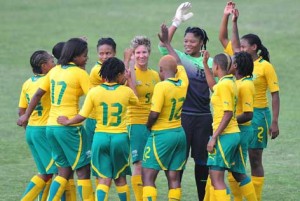 Boosted by a home crowd of 20,000 fans, including President Teodoro Obiang Mbasogo, Equatorial Guinea crushed South Africa 4-0 in the final of the 8th African Women’s Championship in Malabo on Sunday.
Boosted by a home crowd of 20,000 fans, including President Teodoro Obiang Mbasogo, Equatorial Guinea crushed South Africa 4-0 in the final of the 8th African Women’s Championship in Malabo on Sunday.
Banyana Banyana — as the team is affectionately known — held out until the 43rd minute when the home team took the lead through Chinasa’s header from a corner kick. The goal seemed to take the wind out of Banyana’s sails. After the break the qualitative difference between the two sides became evident. Midway through the second half Banyana lost their concentration, giving up three goals in six minutes to the Nzalang Nacional (Nation’s light): Costa (66′), Anonman (70′) and Tiga (72′).
“Falling at the final hurdle is a major disappointment to all involved with Banyana Banyana,” said head coach Joseph Mkhonza at the post-match press conference. In a year that saw South Africa’s women’s team reach two major milestones, competing in the Olympics for the first time and finally beating powerhouse Nigeria, Mkhonza looked ahead and said that “Banyana Banyana should be able to qualify for international tournaments, such as the World Cup and the Olympics, in the future.”
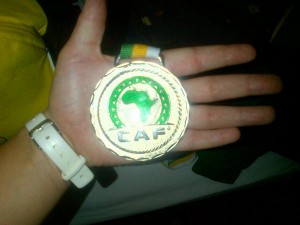 It is always tough to play a final against the host nation, but the big game in hostile territory did appear to get the best of the South Africans. The night before the match, for example, Banyana captain Amanda Dlamini (@Amanda_Dlamini9) shared her state of mind on Twitter. “I don’t know how I’m going to sleep tonight. If I’m going to sleep at all,” she wrote. Then a few hours before the match, defender Janine Van Wyk (@Janinevanwyk5), whose marvelous goal beat Nigeria in Wednesday’s semifinal, tweeted: “Very IMPORTANT game today. I’m so nervous its [sic] insane but I know we will do well.” Perhaps adding to the pressure of the moment, the office of the Presidency (@PresidencyZA) followed by tweeting its support: “President Zuma wishes Banyana well.”
It is always tough to play a final against the host nation, but the big game in hostile territory did appear to get the best of the South Africans. The night before the match, for example, Banyana captain Amanda Dlamini (@Amanda_Dlamini9) shared her state of mind on Twitter. “I don’t know how I’m going to sleep tonight. If I’m going to sleep at all,” she wrote. Then a few hours before the match, defender Janine Van Wyk (@Janinevanwyk5), whose marvelous goal beat Nigeria in Wednesday’s semifinal, tweeted: “Very IMPORTANT game today. I’m so nervous its [sic] insane but I know we will do well.” Perhaps adding to the pressure of the moment, the office of the Presidency (@PresidencyZA) followed by tweeting its support: “President Zuma wishes Banyana well.”
That Banyana could not field three overseas players partly explains Sunday’s result. Midfielder Kylie Ann Louw and reserve goalkeeper Roxanne Barker stayed in the United States due to study commitments, while midfielder Nompumelelo Nyandeni remained with her club in Russia. “Losing a player of Nyandeni’s talent and experience will always be a setback to any team,” said Mkhonza. Another factor to consider has to do with oil-rich Equatorial Guinea’s “willingness to hand out passports to players who agree to play for them without any period of residency,” as Ian Malcolm of goal.com put it. “Almost the entire squad selected for the African Women’s Championship were born outside Equatorial Guinea, most in Brazil, but also in other African states.” While not illegal according to FIFA rules, the ethics of this all-star team formation are questionable.
The buzz about Banyana from South Africans on social media was overwhelmingly positive. “You did South Africa proud, the whole team deserves a heroes welcome. You passed all expectation and showed your greatness,” @RhandzuOptimus wrote in a tweet that captured the general tenor of South Africans’ reactions. The government chimed in too. Sports Minister Fikile Mbalula said that “Although they did not win the (African) Championships, Banyana Banyana have proven that they are an ever improving team that has shown progress over the last year.”
Now that the tournament is over what will happen to the “Banyana Bandwagon”? Practitioners and fans know that women’s football in South Africa needs much more investment and support. Even at the elite level there is no season-long national league. And as Thabo Dladla, founding director of Izichwe Youth Football in Pietermaritzburg, explains in a comment to my previous Banyana post: “There are no competitions for girls junior teams. Our girls only start playing football at the university level. These issues have nothing to do with money. SAFA should play the role in terms of promoting the game.” The road ahead is long and tortuous. We’ll be following developments closely.
Suggested Reading
Prishani Naidoo and Zanele Muholi, “Women’s bodies and the world of football in South Africa,” in Ashwin Desai, ed., Race to Transform: Sport in Post-Apartheid South Africa (HSRC Press, 2010).
Cynthia Fabrizio Pelak, “Women and gender in South African soccer: a brief history,” Soccer and Society 11, 1/2 (2010); 63-78.
Martha Saavedra, “Football Feminine—Development of the African Game: Senegal, Nigeria, and South Africa,” Soccer and Society 4, 2/3 (2003): 225-253.
Tag: African Women’s Championship
Banyana Bandwagon
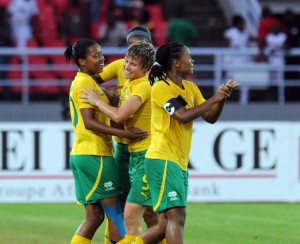 South Africa’s women’s national team recorded its most important victory ever on November 7 by defeating Nigeria 1-0 in the semifinal of the 8th African Women’s Football Championship in Bata, Equatorial Guinea. Defender Janine Van Wyk long-range blast gave Banyana Banyana (The Girls) their first-ever win against the six-time champion Super Falcons. South Africa will face Equatorial Guinea in the final on Sunday, November 11, a team that beat them 1-0 in the first group stage match.
South Africa’s women’s national team recorded its most important victory ever on November 7 by defeating Nigeria 1-0 in the semifinal of the 8th African Women’s Football Championship in Bata, Equatorial Guinea. Defender Janine Van Wyk long-range blast gave Banyana Banyana (The Girls) their first-ever win against the six-time champion Super Falcons. South Africa will face Equatorial Guinea in the final on Sunday, November 11, a team that beat them 1-0 in the first group stage match.
“I have been in the Banyana Banyana side since 2004 and we have tried for so long to beat the Nigerians but luck has never been on our side, but now we have proved that we can compete and beat of the best on the continent,” said Van Wyk. “At the CAF African Championship held in South Africa in 2010 I scored with a free kick from 35 metres out against Nigeria, and my teammates always remind me that I normally reserve my best for matches against Nigeria,” she laughed.
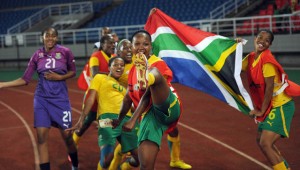 With the men’s team — Bafana Bafana — struggling, it is perhaps not surprising that South African fans and the football establishment are leaping onto the Banyana bandwagon. Following the win against Nigeria, SAFA President Kirsten Nematandani announced he would be flying out to attend the final. “The victory should open doors for the growth of women’s soccer,” he said. “Well done to the girls for making the country proud.”
With the men’s team — Bafana Bafana — struggling, it is perhaps not surprising that South African fans and the football establishment are leaping onto the Banyana bandwagon. Following the win against Nigeria, SAFA President Kirsten Nematandani announced he would be flying out to attend the final. “The victory should open doors for the growth of women’s soccer,” he said. “Well done to the girls for making the country proud.”
“We are in a very positive frame of mind going into the final game against the hosts,” said Joseph Mkhonza, the Banyana head coach. “But we are still focused on attaining our mission of taking gold in this tournament. We came here with a mission and that mission is still on track,” he said. “We have some homework to do before Sunday’s final, knowing we will play in front of a large red-clad crowd in what is certain to be a packed Malabo stadium, but we will be ready for the challenge.”
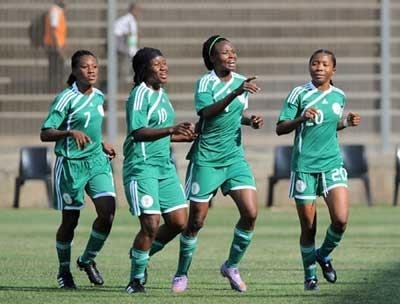
Nigeria 4, Equatorial Guinea 2. The Super Falcons are champions of Africa. The United Nations of Equatorial Guinea put up a good fight, but could not defend their title. Nigeria’s goals came from omniescent Perpetua Nkwocha and Ugochi Oparanozie, and from two own goals — one of them by Carolina, who also headed both of Equatorial Guinea’s goals.
It was 1-1 going into the final 15 minutes, but Nigeria got the job done when it mattered most. Oparanozie’s header made it 2-1 in the 76th minute and just three minutes later an own goal header by Noah Nkein put Nigeria ahead 3-1. Jade pulled one back in the 82nd before Carolina knocked the ball into her own net two minutes later. When the final whistle blew it was nice to see the 15,000 fans applauding the Super Falcons.
Perpetua Nkwocha won the Golden Boot (11 goals) and Stella Mbachu was awarded the Golden Ball for best player of the tournament. In the end, Nigeria dominated the African Women’s Championship and fully deserved their sixth continental crown in seven tries.
I enjoyed following the tournament and watching matches on TV. The women’s game in Africa is clearly progressing technically, tactically and physically. But much more needs to be done at the grassroots level in every country. Long-term growth and sustainable development require greater media attention and sponsorships, as well as support from male-dominated football associations and access to formal training from a young age. Until these components are put into place, expect Nigeria’s dynasty in African women’s football to continue long into the future.
Heartbreak for South Africa
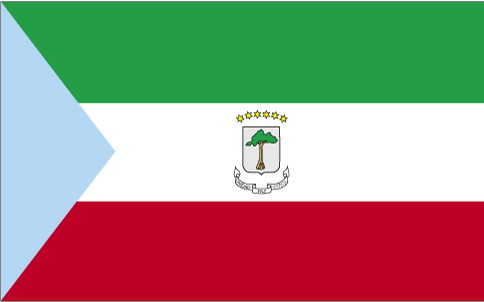
The biggest day in South African women’s football history ended in heartbreak as Equatorial Guinea defeated Banyana Banyana 3-1 after extra time on Thursday at a packed Sinaba stadium in Daveyton outside Johannesburg. After 90 minutes the score was 0-0.
The decisive moment came in the 103rd minute. Salimata Simpore capitalized on a defensive mistake by Van Wyk with a simple finish from just inside the box to give the defending champions a 1-0 lead they did not relinquish.
Psychologically shaken and physically tired, the hosts collapsed. In the 109th minute, a Banyana corner led to a breakaway by Equatorial Guinea that ended with a Jade cross being clumsily deflected by Dludlu inside the far post for an own goal that put the game away. As the deflated home crowd filed out of the stadium, Salimata collected a cross, and in one smooth move faked out a Banyana defender and the goalkeeper to slot home a third goal. Amanda Dlamini saved South Africa’s honor with a delicate chip over the keeper two minutes from time. Final score: 3-1 Equatorial Guinea.
The game had started with the defending champions in control, a fact reflected in their 60 per cent possession of the ball in the first twenty minutes. But the first chance fell to South Africa in the 14th minute when in-form striker Amanda Dlamini squandered the easiest of chances, shooting right at the goalkeeper from close range. Banyana gained confidence and territory in the latter part of the first half, largely thanks to Jafta’s domination of the midfield. Just before the break, Van Wyk’s free kick missile from 40 meters out (!) was tipped over the bar by Miriam. On the ensuing corner, Jafta turned and struck a wonderful shot from near the penalty spot, which forced a miraculous diving save from the Equatorial Guinea keeper. No score after a bruising first half. South Africa would come to rue the missed chances.
The second half was more guarded, neither side wanting to risk making a costly mistake. The Togolese referee seemed far too tolerant of rough tackling, with several players on both sides suffering injuries that required bandaging of heads as well as “holy water” treatment. Despite notching 56 percent of possession, Banyana were unable to penetrate, or seriously threaten the Equatorial Guinea defense anchored by Carolina. Then a turning point in the match: Augustine Makalakalane, South Africa’s coach, replaced Jafta with Makhabane, hoping to gain in creativity and attacking force. Instead the move backfired as Equatorial Guinea asserted control of the midfield. The best chances in the final twenty minutes fell to Chinasa Okoro and Salimata, with goalkeeper Mndaweni doing well to stop them in one-on-one situations.
Dlamini almost won it for South Africa on the stroke of 90 minutes with a high shot to the near post that Miriam parried away for a corner. As we readied ourselves for extra time, Salimata broke away from her marker down the right side but failed to deliver an easy pass to Chinasa for the simplest of tap-in goals. It was a sign of things to come.
Earlier in the day, news reports in South Africa had criticized Equatorial Guinea for quickly giving citizenship to players from Brazil, Cameroon, Ivory Coast, Nigeria, and Senegal. According to kickoff.com, Salimata even played in the AWC qualifiers for Ivory Coast! Cameroon lodged an official protest about Salimata in the group stage, but CAF appears uninterested in pursuing the case.
So Equatorial Guinea and Nigeria — 5-1 winners over Cameroon in the other semifinal — will represent Africa at 2011 Women’s World Cup in Germany. The African champion will be determined on Sunday.
Can Anyone Stop Nigeria?
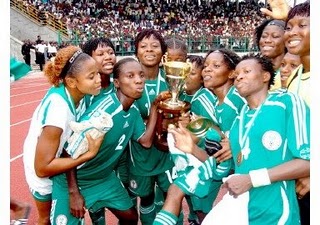
Three victories by a combined score of 10-1 so far in the 2010 African Women’s Championship make Nigeria’s Super Falcons heavy favorites to claim the continental crown.
Led by superstar striker Perpetua Nkwocha’s seven goals, the Super Falcons face Cameroon in tomorrow’s first semifinal. (This match kicks off at 10am. Brunch at Sinaba stadium anyone?). These two West African rivals — in men’s and women’s football — have met in each of the last three AWC tournaments, with Cameroon losing three times (once on penalties) and drawing once. In the 2004 final in South Africa, Cameroon were humiliated by Nigeria 5-0, with Nkwocha scoring four goals. Not a good omen for The Indomitable Lionesses.
South Africa and Equatorial Guinea meet in the second semifinal (3:30pm start, thankfully). This is a rematch of the 2008 title game won by the small oil-rich nation by a score of 2-1. Neither team has played their best football yet so this is likely going to be a riveting contest. Local media have been giving Banyana Banyana unprecedented coverage. The sportive nationalism of the crowds at Sinaba stadium has boosted the confidence, if not the performance, of the South Africans and may well prove decisive against the defending champions.
Prediction: South Africa and Nigeria meet in the final on Sunday.
South Africa through to AWC semis
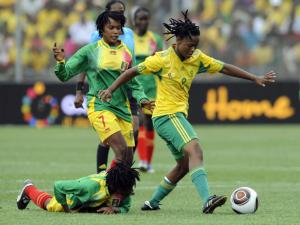
Another packed house at Sinaba Stadium was on hand to support Banyana Banyana in the last match of the group stage of the 2010 African Women’s Championship. Needing only a draw to qualify for the semifinals, South Africa defeated Mali 4-0 to take second place in the group behind Nigeria (3-0 winners over Tanzania). South Africa are one win away from qualifying for the 2011 Women’s World Cup in Germany.
While the scoreline suggests a one-sided affair, Mali and South Africa battled it out fairly evenly for 75 minutes. Ayanda Dlamini, making her first start of the tournament, put Banyana ahead with a nice header in the 32nd minute and it was 1-0 at the break.
The second half was marked by some rough and undisciplined play, with Mali earning four yellow cards and one red. As the West Africans grew more frustrated, Dlamini knocked in a loose ball from five yards out in the 77th minute to put the game beyond reach. Crisp finishing from substitute Seoposenwe (85th) and Sister (89th) then gave the 15,000 home fans more reasons to celebrate Banyana’s passage through to the semifinals. Their opponents will be decided tomorrow; probably Equatorial Guinea or Cameroon, although Ghana still have an outside chance.
Update: Click here to get access to AWC video highlights: http://www.supersport.com/football/african-women-champs/fixtures
Nigeria 2, South Africa 1
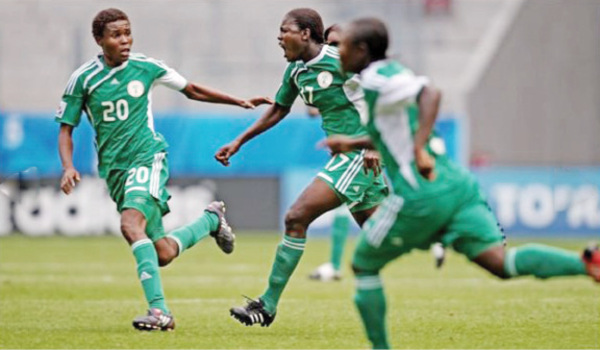
Perpetua Nwkocha was at her stellar best today, scoring two goals as Nigeria defeated South Africa 2-1 at Sinaba Stadium near Johannesburg. The three-time MVP of African Women’s Championships leads the tournament in scoring with five goals in two matches.
The contest was played in a relaxed atmosphere, nothing like the Battle of Vosloruus of 2000. The 15,000 capacity crowd — mostly young men — transformed the ground into a sea of yellow and gold. A small, vociferous group of Nigerian fans countered the vuvuzela cacophony with actual trumpets and drumming.
Banyana started tentatively, but hardly seemed a “desperate team,” as the Nigerian coach said in a pre-game interview. South African goalkeeper Thoko Mndaweni fumbled an easy shot six minutes in, and then failed to come out on a dangerous cross. The Super Falcons moved well on attack, dominating the middle of the park and exploiting their superior speed on the flanks.
Nigeria were rewarded in the 23rd minute, as Nwkocha smoothly finished a 1-on-1, courtesy of an Oji assist and lax marking. Nigeria continued to pile on the pressure, picking up corners and creating chances from their wing play.
Nwkocha made it 2-0 with a towering header off a corner in the 39th minute. Even the home crowd applauded the goal. Five minutes later, Banyana’s central defender Janine Van Wyk struck a thunderous free kick from 30 meters out to bring South Africa back into the game. The wonderful goal revived Banyana and the hopes of the partisan crowd. 2-1 at the halftime break.
I should note that Super Sport’s TV coverage was very good overall. Several cameras provided different angles, though not as many as in PSL (men’s pro) matches. The commentators were fairly solid. They showed respect for Nigeria, avoided condescending remarks, and relied on patriotic verve only a few times. A good sign for women’s football in South Africa and Africa.
As play resumed, South Africa discarded their long-ball approach but strikers Matlou and Popela remained too isolated and, therefore, ineffective.
Nigeria produced the first goalscoring chance of the second half in the 50th minute, before Banyana began to push the visitors back into their defensive half.
But the final twenty minutes saw Nigeria back in control as fatigue slowed Banyana down. The hosts created a last opportunity from a loose ball in the box in the 79th minute, but Nigeria calmly thwarted it. The Super Falcons came close to a third goal in added time and in the end deserved to take all three points from this entertaining and well-played match.